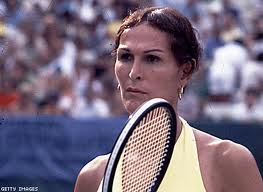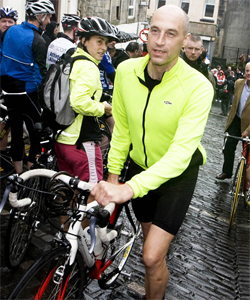“I had to come out because it was too hard not being myself.”
Kye Allums is the first openly transgender athlete to play NCAA Division I college basketball. Allums was a star shooting guard on the George Washington University (GWU) women’s basketball team.
Born Kyler Kelcian Allums in Daytona Beach, Florida, he was the oldest of four children. Nicknamed Kay-Kay, Allums was a self-described tomboy, who identifed as male from childhood. “I’ve always felt most comfortable dressing like a boy, but my mom would take all of my clothes and force me to wear girl clothes,” he says. Allums would put boys’ clothes in his backpack and change before going to school, then change back before he got home. He says it was the only way he could go to school.
Allums received a basketball scholarship to GWU. In his freshman year, he played in 11 games for the Colonials and missed the final 20 due to injury. As a sophomore, he started 20 of 26 games.
That same year, Allums began to distance himself from Kay-Kay and opened up to some of his teammates. “I do not like being called a girl. I’m a guy in a girl’s body,” he said. Thereafter, he told his head coach Mike Bozeman. Allums says his teammates, coach and family have all been supportive.
Allums was advised not to begin taking male hormones or undergo gender reassignment surgery while remaining on the women’s team. If he did, he would risk losing his scholarship and ending his college basketball career. Allums says he’s undecided about when he will continue his transition.
After suffering a total of eight concussions and not starting any games his junior year, Allums announced he would not be returning to the Colonials for his senior season. “I alone came to this decision and I thank the athletic department for respecting my wishes,” he said.
In 2011, Allums began telling his story at speaking engagements and other forums. “It meant a lot to me to help and affect others in a positive way,” he says about sharing his experience with young people struggling with similar issues.
As for his future, Allums says, “I’ll just be trying to make some kind of difference in the world and look forward to my life.”
LGBT History month
Bibliography
- "Allums to leave women's team - Sports." The GW Hatchet. 27 May 2011.
- Associated Press. "YouTube - GW Transgender Player Deals With Wave of Publicity." YouTube. 17 May 2011.
- Beiser, H. Darr, "Transgender Male Kye Allums on the Women's Team at GW” USATODAY.com. 17 May 2011.
- "Kye Allums, Transgender George Washington University Basketball Player, Takes The Court." The Huffington Post. 17 May 2011.
- "Kye Allums: First Transgender Man Playing NCAA Women's Basketball." Outsports.com. 17 May 2011.
- "Kye Allums, Division I Athlete, Tells Us How Being Transgender Feels” Lemondrop.com. 17 May 2011.
- "Player Bio: Kye Allums" GEORGE WASHINGTON OFFICIAL ATHLETIC SITE. 27 May 2011.
- "Transgender Player Leaving George Washington University Women's Basketball Team - by John Atchison." Helium.com. 27 May 2011.
- "Transgender Women's Basketball Player Kye Allums of George Washington Discusses Concussion-marred Season.” ESPN. 17 May 2011.
Website






